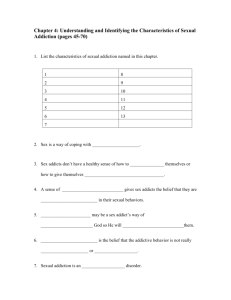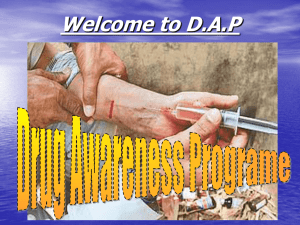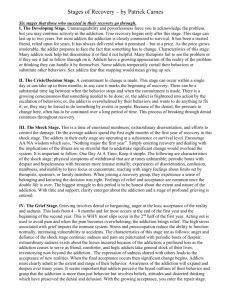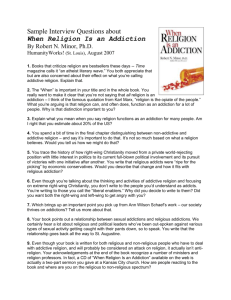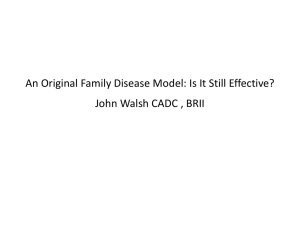Psychological and Behavioural Characteristics of Severe Internet
advertisement
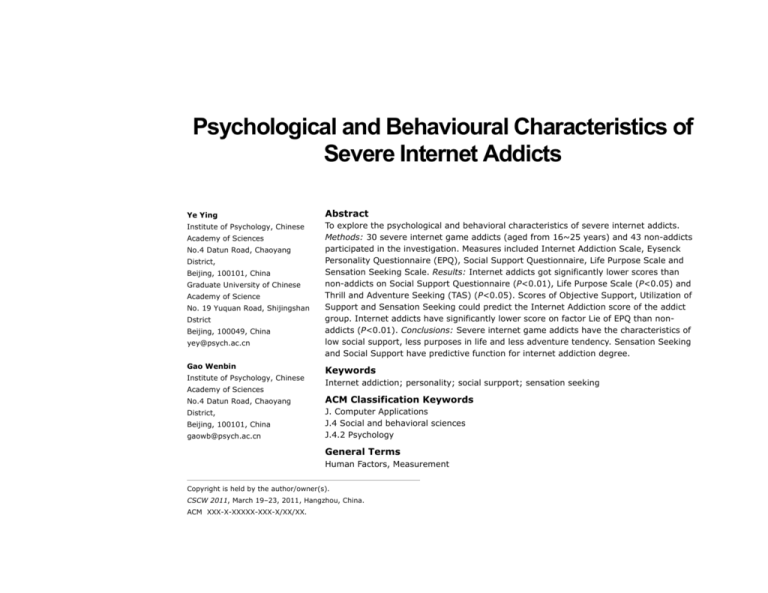
Psychological and Behavioural Characteristics of Severe Internet Addicts Ye Ying Abstract Institute of Psychology, Chinese To explore the psychological and behavioral characteristics of severe internet addicts. Methods: 30 severe internet game addicts (aged from 16~25 years) and 43 non-addicts participated in the investigation. Measures included Internet Addiction Scale, Eysenck Personality Questionnaire (EPQ), Social Support Questionnaire, Life Purpose Scale and Sensation Seeking Scale. Results: Internet addicts got significantly lower scores than non-addicts on Social Support Questionnaire (P<0.01), Life Purpose Scale (P<0.05) and Thrill and Adventure Seeking (TAS) (P<0.05). Scores of Objective Support, Utilization of Support and Sensation Seeking could predict the Internet Addiction score of the addict group. Internet addicts have significantly lower score on factor Lie of EPQ than nonaddicts (P<0.01). Conclusions: Severe internet game addicts have the characteristics of low social support, less purposes in life and less adventure tendency. Sensation Seeking and Social Support have predictive function for internet addiction degree. Academy of Sciences No.4 Datun Road, Chaoyang District, Beijing, 100101, China Graduate University of Chinese Academy of Science No. 19 Yuquan Road, Shijingshan Dstrict Beijing, 100049, China yey@psych.ac.cn Gao Wenbin Institute of Psychology, Chinese Academy of Sciences Keywords Internet addiction; personality; social surpport; sensation seeking No.4 Datun Road, Chaoyang ACM Classification Keywords District, J. Computer Applications J.4 Social and behavioral sciences J.4.2 Psychology Beijing, 100101, China gaowb@psych.ac.cn General Terms Human Factors, Measurement Copyright is held by the author/owner(s). CSCW 2011, March 19–23, 2011, Hangzhou, China. ACM XXX-X-XXXXX-XXX-X/XX/XX. 2 Introduction Most of the studies on psychological characteristics of internet addicts were conducted in schools, and there is little research on internet teenager addicts who need to accept therapy in the hospital, not to mention those who are already hospitalized. The problems of using internet in Chinese are primarily reflected on those who play internet games. This survey focused on the psychological and behavioural characteristics of severe internet game addicts who were hospitalized and receiving therapy, which may help to provide valid data and information for the development of intervention and treatment of severe internet game addiction. II. Methods Participants Internet addcits: 58 severe internet addicts who were hosoitalized and receiving psychological therapy met the following crieteria were diaganosed as internet addiction disorder (IAD) : (1)Young’s (1988) symptoms crieteria[1] (2) Severity criterion: severe social function impariment resulting from overuse of internet; (3) Course of disease: meeting the symptoms criteria and severity criterion for at least one month; (4) Exclusion criteria: we excluded those with organic mental disorder, schizophrenia, affective disorder, and internet addiction caused by psychoactive substances or nonaddictive substances and those who got scores under 50 on the Internet Addiction Scale (Chinese Version).The 30 legal participants left were all male, aged between 16 to 25 yeas (M=18.4, SD=2.5). Control group: 60 sophomores from a senior high school and a university in Beijing were measured by the Internet Addiction Scale (IAS, Chinese Version). 43 legal participants were those who were using internet and got a score under 50 on the IAS. Their average age was 18.8 (SD=1.8). Measures Internet Addiction Scale (IAS, Chinses Version) was translated and revised from Internet Addiction Impairment Index (IAII)[2].The IAS has 20 items likert 1~5. In this survey, the Cronbach’ α was 0.936. Eysenck Personality Questionnaire’s (EPQ) Chinese Adult Version[3] has 85-item scale consists of four subscales: E sub-scale is for Extrovision-Introvision; N subscale is for Neuroticism; P sub-scale is for Psychoticism; and L sub-scale is for Lie. Social Support Questionnaire [4] measures one's social support from three dimesions: subjective support, objective support, and the utility of support. The higher score a participants gets, the more support he/she feels or gets. Life Purpose Scale[5] was designed to measure whether a person’s life is meaningful and purposeful. The higher score a person gets the more meaningful and purposeful his/her life is. Sensation Seeking Scale (SSS)[6] has 40-item and is divided into four sub-scales: thrill and adventure seeking (TAS), experience seeking (ES), Disinhibition (Dis), and Boredom Susceptibility (BS). Procedures Informed consent was obtained from the partipants and their parents. All the internet addicts were assembled in a quiet room and asked to accomplish all the quetionnaires independently under the guidance and supervision of the investigator. So did the participants in control group. Data analysis All the data was analyzed with Statistical Program for Social Sciences (SPSS) 11.5. 3 III. Results Comparisons of psychological and behavioural characteristics between internet addicts and control group Internet addicts got significantly lower scores than nonaddicts on Social Support Questionnaire (t=3.21, P<0.01) and one of its factors Subjectve Support (t=3.83, P<0.01), Life Purpose Scale (t=2.57, P<0.05) and thrill and adventure seeking (TAS) of Sensation Seeking Scale (t=2.10, P<0.05). Multiple linear regressions for the internet addicts’ addiction degree Stepwise multiple linear regressions were conducted to understand which psychological and behavioural variables could predict the addiction degree of the internet game addicts. All the psychological and behavioural characteristics measured in this survey were independent variables. The results in Table One showed that the scores of utility of support, objective support and sensation seeking were playing a role in predicting the addiction degree of the internet addicts. Table 1 Multiple linear regressions for the internet addicts’ addiction degree Utility of support B SE (B) β t -3.153 0.859 -0.534 3.672** Sensation seeking 0.591 0.230 0.369 2.563* Objective support -0.925 0.446 -0.297 2.073* *P<0.05, **P<0.01 Comparisons of Eysenck personality questionnaires between internet addicts and control group T tests were taken to compare their respective scores on each subscale of Eysenck Personality Questionnaires to understand the personality differences between the internet addicts and the control group. The results showed that score of internet addicts on Lie sub-scale was significantly lower (t=3.46, P=0.001) than that of control group’s. On Psychoticism sub-scale, score of internet addicts was marginally higher (P=0.06) than that of control group’s. IV. Discussion Results of this investigation showed that low social support was one of the key characteristics of severe internet addicts, and severe internet addicts lacked life purpose and clear sense of direction. In addition, what can be implied from the survey is that there is a greater possibility that people with low thrill and adventure seeking tendency will indulge in internet games, as the results showed that severe internet addicts usually withdrawed from the society and rejected to accept themselves. For these people, internet environment is a relatively safe place to escape from the reality. Social support has been being used to measure a person’s mental health, for it can help people to cope with stress and maintain good feelings[4]. The results of this investigation demonstrated that the social support that could be provided for severe internet addicts is comparatively little. What is worse, these addicts might have no idea how to utilize the limited supporting resource, so that they chose to escape from the troubles in reality. In this sense, internet functions as a haven for the addicts, and this is one of the reasons why it is extremely difficult for internet addicts to control their playing time on internet. On the other hand, sensation seeking is a person’s personality characterized as seeking experience of diversity, novelty and complexity[7]. Former research pointed out that the personality of sensation seeking 4 was a pathogenic cause of drug addiction, and boredom susceptibility dimension was significantly correlated with internet addiction[7]. As we know, internet addiction is classified in the category of "abnormal habits and impulse control disorder"[8], which is a kind of "non-substance-related behavioural addictions"[9]. So there is a possibility that sensation seeking is a predictive factor to internet addiction. Reference [1] [2] [3] In addition, low score on Lie sub-scale indicates that internet addicts are inclined to give up themselves. Generally speaking, people are more prone to overestimate themselves and show their good side on self-report questionnaire. However, Internet addicts with low social support seemingly do not care about others’ evaluation about themselves and feel no need to lie about their negative beliefs about themselves. Furthermore, Psychoticism represents a personality of loneliness and stubbornness. People with this personality do not care others and have difficulty in adapting evironment. It is speculated that young people with high psychoticism are more likely to indulge in internet. V. Conclusions Severe internet addicts are in worse mental health condition with less supporting resource than non-addicts. Also, personality factors are important in the emergence and process of internet addiction. Internet addicts are probably with the personality of low sensation seeking and high Psychoticism. All these information can be used in the treatment and therapy of severe internet addiction. [4] [5] [6] [7] [8] [9] K.S. Young, "Internet addiction: The emergence of a new clinical disorder", CyberPsychology and Behavior, vol 1 (3), pp. 237-244, 1988. K.S. Young, Caught in the Net, How to Recognize the Signs of Internet Addiction and a Winning Strategy for Recovery. New York: John Wiley & Sons Inc, 12-120, 1998. Zhonggeng Chen, "Item analysis of Eysenck Personality Questionnaire tested in Beijing district", Acta Psychologica Sinica, vol 2, pp. 211217, 1983. Shuiyuan Xiao, "Social support questionnaire", In Xiangdong Wang et al.(Eds), Rating Scales for Mental Health, Beijing: Chinese Mental Health Journal, pp. 127-131, 1999. Crumbaugh. "Test of the purpose of life", In J. P. Robinson, P. R. Shaver, L. S. Wrightsman,(Eds), Measures of Personality and Social Psychological Attitudes, trans. Zhongfang Yang, Taibei: YuanLiou Publishing Co., Ltd., pp.442, 1997. Yuqing Zhang, Zhonggeng Chen, "An experimental study on the sensation seeking trait of special teenagers", Acta Psychologica Sinica, vol 22, pp. 376-386, 1990. Xiaojuan Jing, Yuqing Zhang, "The addicts' personality traits of sensation seeking", Advances in Psychological Science, vol 12 (1), pp. 67-71, 2004. American Psychiatric Association. (2000). Diagnostic and statistical manual of mental disorders (4th edition.). Washington, D.C.: American Psychiatric Press. Marks, I. (1990). Behavioural (non-chemical) addictions. British Journal of Addiction, 85, 1389– 1394.

